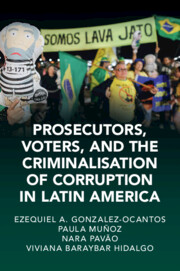Book contents
- Prosecutors, Voters, and the Criminalisation of Corruption in Latin America
- Cambridge Studies in Law and Society
- Prosecutors, Voters, and the Criminalisation of Corruption in Latin America
- Copyright page
- Contents
- Figures
- Tables
- Acknowledgements
- 1 Introduction
- Part I Causes
- Part II Public Reactions
- 5 Fighting Corruption, Curbing Cynicism?
- 6 Of Cockroaches and Superheroes
- 7 Is Prosecutorial Zeal What Partisans Make of It?
- 8 Prosecutorial Trade-Offs and the Precarity of Hope
- Part III Conclusions
- Bibliography
- Index
- Cambridge Studies in Law and Society
5 - Fighting Corruption, Curbing Cynicism?
Crusades, Emotions, and the Future of Politics
from Part II - Public Reactions
Published online by Cambridge University Press: 05 April 2023
- Prosecutors, Voters, and the Criminalisation of Corruption in Latin America
- Cambridge Studies in Law and Society
- Prosecutors, Voters, and the Criminalisation of Corruption in Latin America
- Copyright page
- Contents
- Figures
- Tables
- Acknowledgements
- 1 Introduction
- Part I Causes
- Part II Public Reactions
- 5 Fighting Corruption, Curbing Cynicism?
- 6 Of Cockroaches and Superheroes
- 7 Is Prosecutorial Zeal What Partisans Make of It?
- 8 Prosecutorial Trade-Offs and the Precarity of Hope
- Part III Conclusions
- Bibliography
- Index
- Cambridge Studies in Law and Society
Summary
This chapter theorises the impact of crusades on voters’ attitudes and emotions towards politics. Optimists expect a message of regeneration that instils hope. Pessimists think crusades tell an all too familiar story of decay, triggering anxiety, fear, anger, and disaffection. The actual outcome, however, is likely more conditional and variable as the crusade progresses. No one likes corruption, so citizens should in principle welcome crusades, but not everyone sees these efforts with the same eyes or draws the same conclusions. First, it matters whether citizens fixate on the crimes revealed during the process, and therefore experience a negative information shock, or also pay attention to the proposed judicial solution to corruption. Second, when voters pay attention to the investigative effort, how do they evaluate it? Fairness and effectiveness evaluations are shaped by voters’ partisan attachments to defendants. Unorthodox investigative tactics can also trigger fairness concerns among partisans and neutral observers. Hope can therefore quickly fade as the inquiry progresses and the consensus around the merits of anti-corruption suffers.
- Type
- Chapter
- Information
- Prosecutors, Voters and the Criminalization of Corruption in Latin AmericaThe Case of Lava Jato, pp. 155 - 177Publisher: Cambridge University PressPrint publication year: 2023



